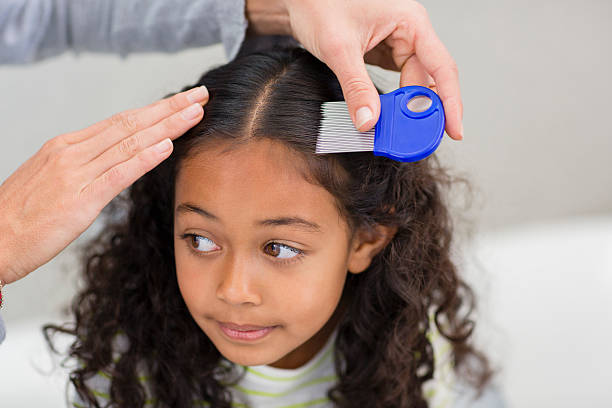
Many explanations exist for why Black individuals acquire head lice less commonly. Science is less productive. Dr. King says, “Any theories are based on data from observational studies. And there have been conflicting data in different studies.”
The Limited Science On Lice & Black Hair
Sample data we’re working with: Black students were initially excluded from a 1985 Hillsborough County, Florida, research on lice in elementary school pupils. As the study proceeded in 1986 and 1987, the authors performed three-month surveys and found that 97 (6.4 percent) of 1,515 white, Latino, and Asian kids acquired lice, but none of the 436 Black children did. Milton Orkin and Howard Maibach’s book Cutaneous Infestations and Insect Bites reported Florida research that found lice were 35 times more common in Caucasians and Asians than Black individuals.
American studies demonstrate a low lice frequency in Black youngsters, but not in Africa. WHO says, “Despite reports from the USA that Black students are less infested than white, head lice are a serious problem in Africa.” According to the survey, students in urban and rural African schools had infection rates between 3.76 and over 50 percent. In 1989, three dermatologists said, “The head louse does not bother American Black children, although he does torment youngsters in Africa.” The reasons for this are unknown.
What Is The CDC’s Latest Guidance On Head Lice?
New head lice guidelines from the CDC have been reported on local TV news stations nationwide for the next school year. The CDC’s website states no recent changes. Many parents and school administrators may not know the current recommendations. Parents need to know what?
You may recall getting sent home early for head lice treatment at school, whether you had them or a buddy did. This approach was meant to treat youngsters quickly and prevent the spread. The “new guidance” from years ago no longer recommends the policy you may recall as a child.
In their current guidelines, the CDC no longer recommends sending head lice-infected pupils home early. After a successful lice treatment at home, pupils may return to school the following morning, according to the organization.
Texture Matters
The argument that Black people don’t acquire lice is because our tighter curl patterns are harder for lice to traverse. But it may not be true: 2016 Iranian research indicated that children with curly hair had a greater rate of head lice infestations than those with straight hair, indicating that all hair types are susceptible to this parasite. “External influences may have affected this research. Dr. Ingleton believes Iranian lice are better at sticking to curly hair. This supports her notion that lice develop to live in the most prevalent hair textures.
“I think the issue will come down to exactly what evolutionary pressures the lice have been subjected to over time,” says Dr. King, who, like Dr. Ingleton, believes lice avoid kinky hair textures in the US. It will have adapted to particular hair types. The pubic lice adapted to handle curly pubic hair.”
Do Our Hair Products Prevent Head Lice?
Black people utilize oils and lotions to preserve and control their hair, including curls and kinks. Others believe these products make Black hair unfriendly to lice. “They could perhaps make it more difficult for the nits [empty lice egg cases] to adhere to the hair shaft,” he adds.
A study on lice treatment in the US found that household products like mayonnaise, olive oil, tub margarine, thick hair gel, and petroleum jelly have been used to treat head lice. The study says, “Applying a thick coating of such agents to the hair and scalp and leaving it overnight theoretically occludes lice spiracles and decreases respiration.” The report cautions that “There are no published trials on the efficacy of such home remedies.” Dr. Zeichner says, “Lice love straight or wavy hair because they cling to it. Lice claws connect better to this hair structure. Although rare, lice may infect African Americans with highly curly hair.”
Treating Lice In Afro-Textured Hair
Yes, Black people may get lice. Kinky hair makes parasite identification and treatment tougher. There are topical lice treatments for the scalp and hair. To carefully remove nits and lice from hair, the CDC recommends using nit combs, often included in head lice treatment kits. Fine spokes make the comb tough to use on kinky curls. We can’t cure the problem with chemicals and combs since they won’t fit our hair.
Using fine-tooth combs to identify lice and nits is challenging in naturally kinky hair and while using protective styles like locs, braids, or weaves. Because fine-tooth combs may damage hair, we use wide-tooth ones.
DIY hair masks include shaving cream, apple cider vinegar, and peppermint oil. Some study suggests that essential oils like peppermint and tea tree may aid with lice removal. Dr. Ingleton says he wouldn’t offer it to his patients since there’s no proof it works. Removing lice with locs and tough hair may be challenging, but prescription or OTC treatments like permethrin lotions like Nix can be effective. Follow the instructions carefully and may require a second treatment “Dr. Ingleton comments.
To avoid allergies, dilute and patch-test peppermint or tea tree oil before using it. It may assist if used with other effective medicines.” Curly-kinky hair sufferers must use a fine-tooth comb following the prescription or OTC therapy, even if it’s uncomfortable. “Wet hair, apply a conditioner or detangler, and comb in tiny parts. Combing is the safest and most effective approach to get rid of head lice, but it’s tiresome, Dr. Ingleton suggests.
Lice like dark locations like the back of your ears and the nape of your neck to hide. “Dr. Ingleton suggests that employing hair heating devices like hair dryers or flatirons may have some effectiveness in eliminating lice, although little research supports this. Don’t just grab your flatiron. “You would definitely want to combine this with other methods, and you should also be careful as some OTC and prescription lice treatments are flammable,” he says.








